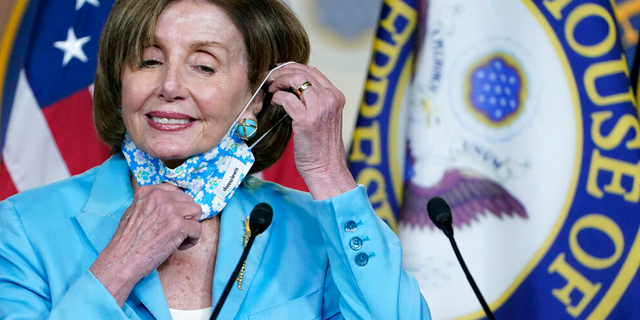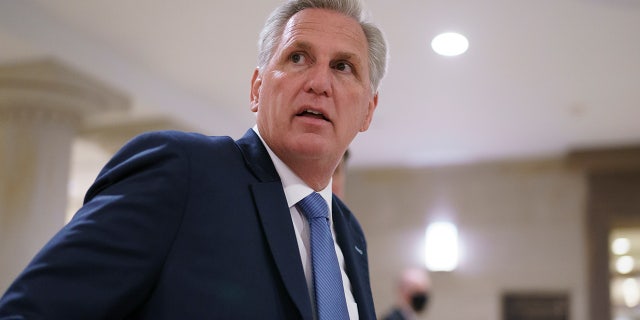Sen. Cotton demands answers from the NIH regarding COVID-19 origin
Sen. Tom Cotton, R-Ark., discussed a letter he and six other senators sent to Dr. Francis Collins, the director of the National Institutes of Health (NIH), three days before requesting information on gain of function research.
Let’s start with a general premise on Capitol Hill: Members of Congress don’t like to be told what to do.
But lawmakers agree to a certain set of rules – on which Members themselves vote – for how the House and Senate operate. A lot of those rules deal with how lawmakers comport themselves, conduct themselves and respect the institution. Lawmakers may vote no or disagree with the rules.
But…
Them’s the rules.
Article I, Section 5 of the Constitution grants both the House and Senate the authority to establish their own rules. For a short period, or, practically indefinitely.
Lawmakers have periodically picked individual fights with U.S. Capitol Police, sworn to protect order at the Capitol.
House Speaker Nancy Pelosi of Calif., takes off her face mask to talk to reporters on Capitol Hill in Washington, Wednesday, May 19, 2021, about legislation to create an independent, bipartisan commission to investigate the Jan. 6 attack on the United States Capitol Complex.
(AP)
The USCP generally grants great deference to lawmakers, especially when it pertains to “coming and going.” The cops may stop Congressional staff or journalists from moving around the Capitol at various times. But Article I, Section 6 of the Constitution includes the “Speech or Debate” Clause. That provision essentially inoculates lawmakers from “arrest” when they are conducting official Congressional business, such as voting. Or, more broadly, driving to the Capitol to vote.
This is why there was a brouhaha in March 2006 when former Rep. Cynthia McKinney, D-Ga., hit a U.S Capitol Police Officer as she tried to enter a House office building. The officer didn’t recognize the Congresswoman. But she didn’t stop for him.
Rep. Don Young, R-Ark., did the same in July 2014. Authorities shut down the House wing of the Capitol one morning after maintenance workers inadvertently yanked asbestos out of the Capitol ceiling. Officers told Young that no one could enter the Capitol – including Members – until they evaluated if there was any danger. But Young barged past the officers and into the building.
“I don’t care if the building is closed,” said Young.
In short, you really can’t tell lawmakers to do anything. They will do what they’re going to do.
The pandemic and the Capitol riot triggered one of the most tumultuous periods in Congress since the Civil War. So, you can imagine the resistance among lawmakers during the early days of the pandemic when they were ordered to don masks. And now some House Republicans want the House to ditch masks as the pandemic eases.
GOPers blame House Speaker Nancy Pelosi, D-Calif., for maintaining a mask mandate on the House floor.
“She craves power and she uses it to try to spank us into doing things,” complained Rep. Ralph Norman, R-S.C., on Fox about the Speaker. “This is just a heavy-handed tactic.”
Norman was one of six lawmakers fined $500 for not wearing a mask on the floor. If a member fails to mask up, the House docks them again. $2,500 for a second offense.
In addition to Norman, the House also dinged Reps. Beth Van Duyne, R-Texas, Mariannette Miller-Meeks, R-Iowa, Marjorie Taylor Greene, R-Ga., Thomas Massie, R-Ky., and Brian Mast, R-Fla., with $500 fines. House officials tagged Reps. Lauren Boebert, R-Colo., Chip Roy, R-Texas, Bob Good, R-Va., Mary Miller, R-Ill., Louie Gohmert, R-Texas, and Marcy Kaptur, R-Ohio, with official warnings.
“They sent me my little envelope today saying, ‘Oh, here you go. Here you go. You’re fined. Here’s your fine,’” complained Mast on Fox. “(Democrats) don’t care. They just want the control. Whether it’s through science. Whether it’s through lying. Whether it’s through hurting you and your pocketbook and trying to get you to comply.”
Republicans may not embrace the House mask rule. But the full House voted to require masks on the floor. The same with a recent rule requiring members pass through metal detectors to enter the House chamber. Members voted on that provision, too. The House now fines members $5,000 if they don’t walk through metal detectors to reach the House floor.
Of course, Democrats abhorred internal rules okayed by Republicans when they ran the show here. Multiple Republicans upbraided then-House Sergeant at Arms Paul Irving after the late civil rights icon Rep. John Lewis, D-Ga., and Rep. John Larson, D-Conn., led a 2016 sit-in on the floor to protest gun violence. Republicans were beside themselves that Democrats would actually sit on the carpet in the well of the House chamber to make their point. Some GOP members implored Irving and his aides to arrest Lewis and others – precisely the optic Democrats would love to have.
Then House Speaker Paul Ryan, R-Wis., described the sit-in as “chaos” and worried it set a “very dangerous precedent.”
In January 2017, the House approved a new set of rules for the 115th Congress. Included in the rules package were fines for members who may disrupt the House, such as with a sit-in. Lawmakers could also face sanctions if they broke House protocol by telecasting their own video stream from the floor or snapped pictures. Such was the rage during the sit-in. Members would first receive a warning. Then, face a $500 fine. Finally, the House would levy a $2,500 fine for additional infractions.
Democrats cried foul.
Sound familiar?
The difference is that Democrats imposed the mask rule since they are in the majority now and Republicans don’t like it. And Republicans imposed the sit-in rule when they ran the House and Democrats objected while in the minority.
Welcome to Congress.
Capitol Attending Physician Dr. Brian Monahan clarified House mask guidance in a statement to the Congressional community last week. Monahan reiterated a House rule which requires members to mask up on the floor unless speaking.
According to Pelosi, it comes down to vaccinations.
“We have a responsibility to make sure that the House of Representatives’ chamber is not a Petri dish because of the selfishness of some not to be vaccinated,” said Pelosi. “What is this? The honor system? The honor system as to whether somebody’s been vaccinated? Do you want them breathing in your face on the strength of their honor?”
House Minority Leader Kevin McCarthy, R-Calif., at the Capitol in Washington, Thursday, May 13, 2021.
(AP)
The House blocked a resolution by House Minority Leader Kevin McCarthy, R-Calif., to lift the floor mask rule last week. McCarthy contends the House mandate is “contrary to the latest CDC guidance.”
“Apparently, COVID works differently in both chambers. Because in the Senate, you don’t wear a mask. In the House, you have to wear a mask. The only difference is the Speaker. She doesn’t want to abide by the CDC rules,” alleged McCarthy.
But Monahan says the policy “is entirely consistent with Centers for Disease Control prevailing mask guidance” and reviewed by CDC experts.
“The attending physician has said until everybody’s vaccinated, we wear masks,” said Pelosi.
This prompted some Republicans to question Monahan’s independence.
I would like to see an organizational chart who Dr. Monahan answers to,” said Rep. Bruce Westerman, R-Ark., the ranking Republican on the House Natural Resources Committee. “It appears that his message just mimics whatever (Pelosi’s) message is.”
Monahan’s been the Attending Physician for both the House and Senate for 12 years, under both GOP and Democratic control of the House and Senate.
Sen. John Kennedy, R-La., is vaccinated. He recently pressed CDC Director Rochelle Walensky at a Senate hearing as to whether he could stroll over from the Senate side of the Capitol to the House side – sans mask.
Walensky replied that mask policies are a “local” decision.
It’s said that all politics is local. And that’s the difference between House rules and Senate rules.
But, just like in cities and states, not everyone follows the rules.
Source: Read Full Article




